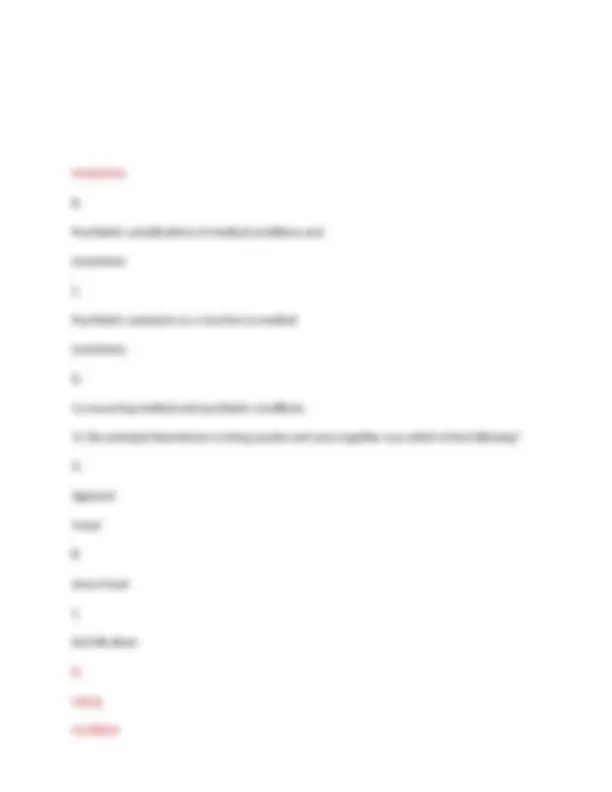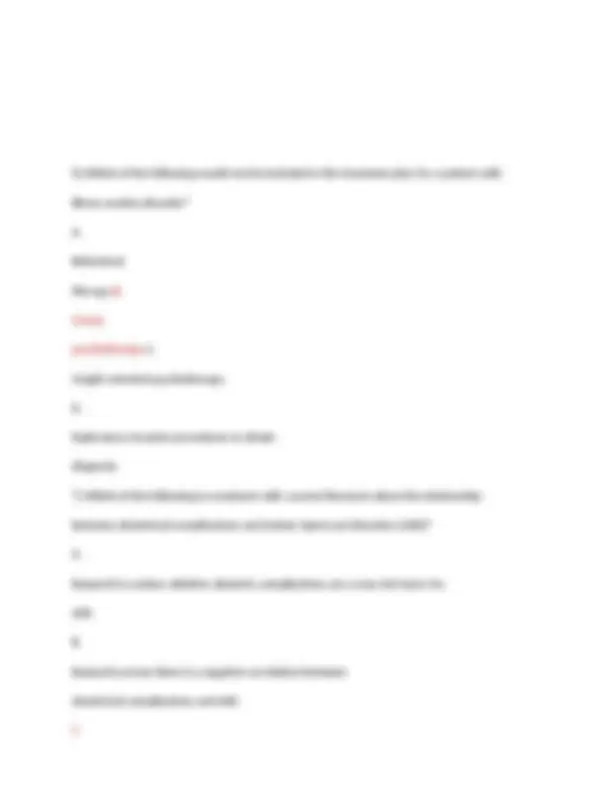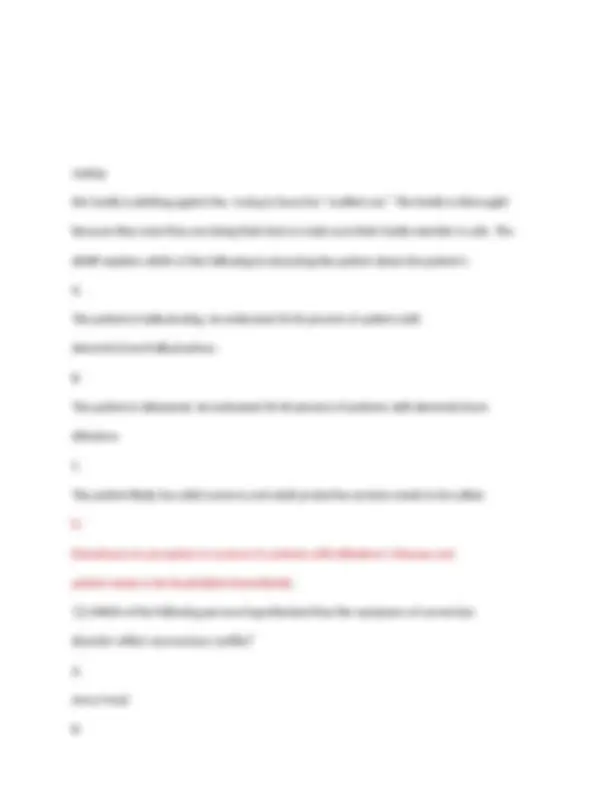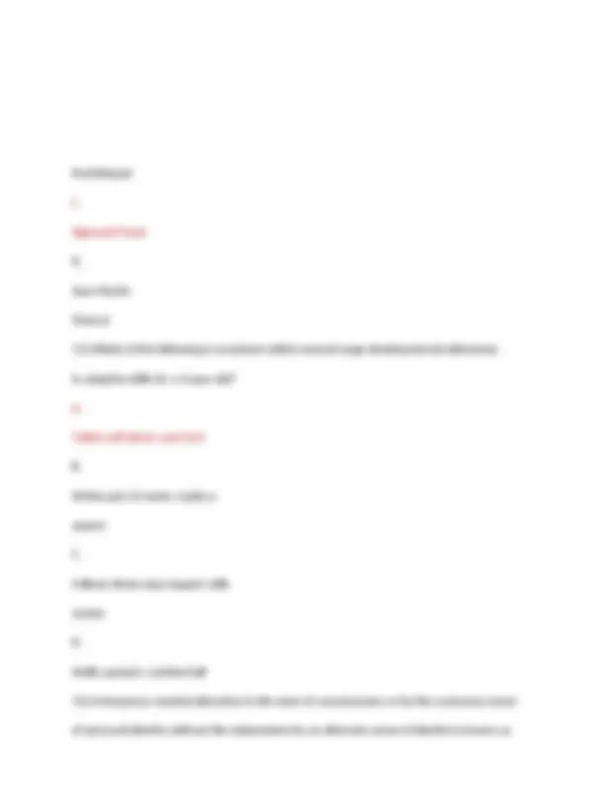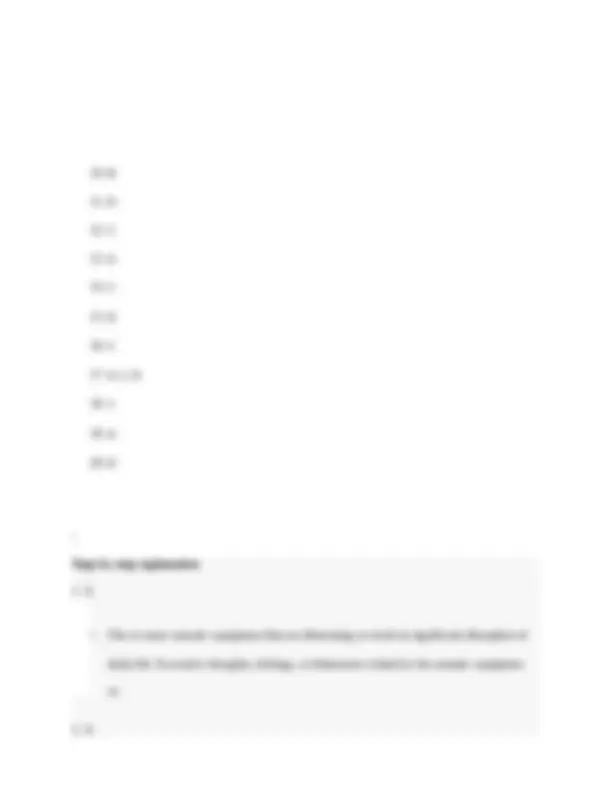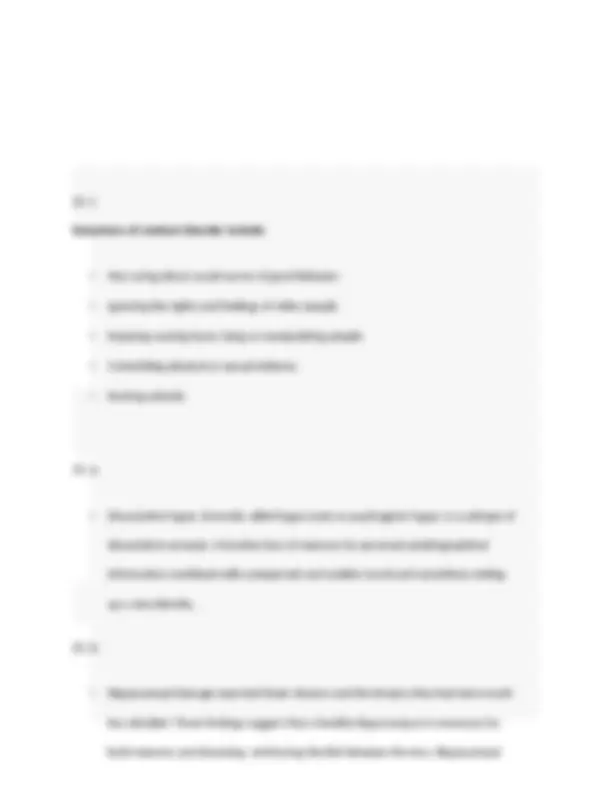Download NRNP 6665-01, Week 11 Final Exam Questions with 100% Correct Answers & Explanations and more Exams Medicine in PDF only on Docsity!
NRNP 6665-01, Week 11
Final Exam Questions with 100% Correct
Answers & Explanations
- An illness of symptoms or deficits that affect voluntary motor or sensory functions, which suggest another medical condition but that is judged to be caused by psychological factors because the illness is preceded by conflicts or other stressors in known as which of the following? A. Factitious disorder B. Illness anxiety disorder C. Somatic symptom disorder D. Functional neurological symptom disorder
- A condition characterized by the person giving approximate answers, with clouding of consciousness, frequently accompanied by hallucinations or other dissociative, somatoform or conversion symptoms is A. Ganser
Syndrome B. Schizophrenia
treatments B. Psychiatric complications of medical conditions and treatments C. Psychiatric symptoms as a reaction to medical treatments. D. Co-occurring medical and psychiatric conditions.
- The principal theoretician to bring psyche and soma together was which of the following? A. Sigmund Freud B. Anna Freud C. Karl Abraham D. Georg Groddeck
- Which of the following would not be included in the treatment plan for a patient with illness anxiety disorder? A. Behavioral therapy B. Group psychotherapy C. Insight oriented psychotherapy D. Exploratory invasive procedures to obtain diagnosis
- Which of the following is consistent with current literature about the relationship between obstetrical complications and Autism Spectrum Disorders (ASD)? A. Research is unclear whether obstetric complications are a true risk factor for ASD. B. Research proves there is a negative correlation between obstetrical complications and ASD. C.
Pick's disease B. Lewy body dementia C. Huntington's disease D Creutzfeldt-Jakob
. disease
- Which of the following demographics are consistent with autism spectrum disorder (ASD) A. Female to male ratio (4:1) B. Onset of symptoms by age 3 C. Affects 1 in 100 children D. All the above
- The ARNP is working with the family of a patient with Alzheimer's Disease who keeps
stating the family is plotting against her, trying to have her "snuffed out." The family is distraught because they state they are doing their best to make sure their family member is safe. The ARNP explains which of the following in educating the patient about the patient's A. The patient is hallucinating. An estimated 20-30 percent of patient with dementia have hallucinations. B. The patient is delusional. An estimated 30-40 percent of patients with dementia have delusions. C. The patient likely has valid concerns and adult protective services needs to be called. D. Disturbance in perception is common in patients with Alzheimer's Disease and patient needs to be hospitalized immediately.
- Which of the following persons hypothesized that the symptoms of conversion disorder reflect unconscious conflict? A. Anna Freud B.
which of the following? A. Ganser Syndrome B. Dissociative Trance Disorder C. Dissociative Identity Disorder D. Factitious Dissociative Identity Disorder
- Differential diagnoses to be considered when diagnosing Ganser syndrome include which of the following? A. Organic dementia B. Depressive pseudodementia C. Korsakoff's syndrome D.
All the above
- A patient who has been raped, presents with the inability to recall important personal information and any information about the rape, does recall events prior and since. There does not appear to be any physiological reason for this. This presentation is consistent with which of the following diagnoses? A. Dissociative amnesia B. Dissociative amnesia with dissociative fugue C. Localized dissociative amnesia D. Generalized dissociative amnesia
- Depersonalization can result from which of the following conditions? Check all that apply. A. Seizure disorders B. Brain tumors
impairment in social, occupational, or other important areas of functioning is most specifically known as which of the following? A. Dissociative fugue B. Dissociative amnesia C. Posttraumatic amnesia D. Systematized amnesia
- Which of the following is NOT considered a nonpathological form of amnesia? A. Hypnotic amnesia B. Generalized amnesia C.
Infantile and childhood amnesia D. Amnesia for sleep and dreaming Answer & Explanation Solved by verified expert Rated Helpful Answers:
- A
- A
- A
- A
- D
- B
- C
- B
- B
- The most well-recognized symptom of Ganser syndrome is the so-called symptom of approximate answers. [1] This is when a patient responds to questions with an incorrect answer, but by the nature of the answer reveals an understanding of the question posed.
- A
- Delirium is an acute psychiatric disorder that is caused by physiological and/or pharmacological factors. polypharmacy is an independent risk factor for delirium in a population of elderly patients after emergency admission.
- A.
- Medical complications of psychiatric conditions or treatments
- D
- Goddeck developed an effective approach to the investigation of the mind- body conundrum. "Psyche & soma" Nevertheless, his unique contribution to modern Psychosomatic Medicine has been permanently obscured.
- B
- Group psychotherapy, which typically involves several people who all have anxiety disorders, can be effective for both treating anxiety and providing patients with support.
- C
- The factors associated with autism risk in the meta-analysis were advanced parental age at birth , maternal prenatal medication use, bleeding, gestational diabetes, being first born vs. third or later, and having a mother born abroad.
- B
- Scientists estimate that kleptomania occurs in 5 to 10 percent of psychiatric patients. Studies suggest that 0.6% of the general population may have this disorder and that it is more common in females than males.
- B
- The causes of dementia can vary, depending on the types of brain changes that may be taking place. Other dementias include Lewy body dementia, frontotemporal disorders, and vascular dementia. It is common for people to have mixed dementia — a combination of two or more types of dementia.
- B
o blows nose when reminded
o uses toilet independently
- C
- Dissociative disorders involve problems with memory, identity, emotion, perception, behavior and sense of self. Dissociative symptoms can potentially disrupt every area of mental functioning.
- D
- C
- Localized amnesia involves being unable to recall a specific event or events or a specific period of time; these gaps in memory are usually related to trauma or stress.
- A, C and D A. Seizure disorders C. Vertigo D. Meniere's disease


